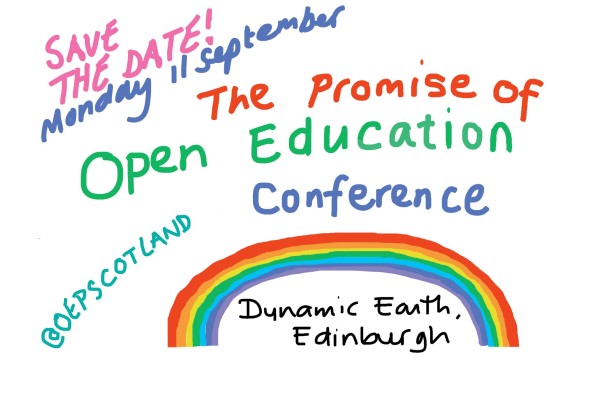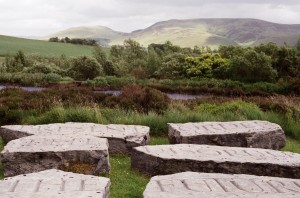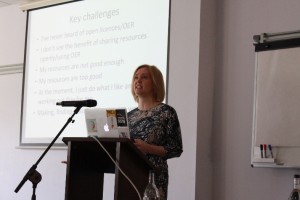Category Archives: OEPS Forum
Save the date! OEPS final event

OEPS final event save the date (by Anna Page, CC BY NC SA 4.0)
‘The promise of open education’ conference is the final event of the OEPS project. It will take place on Monday 11th September in Dynamic Earth, Edinburgh. Further details about the event will be made available soon, however please save the date in your diaries.
Students as co-producers
The problem with students as co-producers is that they already are creators of value, we just need to recognise it
At the OEPS forum in Glasgow in late 2015 the final plenary was about what the OEPS project does. On one level the agreement with the Scottish Funding Council details exactly this. Kerr Gardiner, from the OEPS steering group (you can read an interview with him on the OEPS hub) argued that OEPS would have only met the letter of the KPI’s if it only “made stuff”. I agree, educational practices are about doing things, and doing things to find out how to do things, to find answers, and to find out what the right questions are in the first place. One of the questions Kerr asked on that day was, why open educational practices are not leading to a world where students are recognised and valued as creators/producers of knowledge.
I said to Kerr at the end of the day that I had also wondered about this question and I would think about it further. The Thought piece: students Participation, Openness and the Curriculum is the result. In it I make some quite provocative claims. I suggest one of the problems is quality assurance, where student participation is part of a series of competition mimicking metrics and part of the application of private sector models to public goods. Academics are rightly suspicious of “tick box” approaches to measuring the value of education, as are many learners, and student co-production has become tarnished by association. This links to treating learners as customers and approaches to student co-production drawn from contemporary narratives on “Service Design”, designing for and from end users, or “Design Thinking”, start with the assumption of learner as consumer. This approach fatally undermines participation, as even though learners sometimes behave as service users, learning is about more than this. Learners know this, as do educators.

Atención al cliente: Customer Service, Rahul Rodriguez, https://www.flickr.com/photos/rahulrodriguez/9160573259 (CC BY-SA-2.0)
I mention design, in part because I used to feel “Design Thinking” was part of the solution, I now see the assumptions about customers and how value is created do not map well onto education. However, what does apply is the sense of who is the expert, designers think of themselves as the experts in process and, even when listening to “customer”, the product. Likewise, educators have their own values. I noted above that this makes them suspicious of approaches to education that treat learners as customers and measuring the value of education through crude metrics. However, being the arbiter of quality and value in learning also makes it difficult for educators to “let go”. So while it is tempting to blame issues around student participation on the marketisation and metricisation of value in HE perhaps educator ego also makes a contribution.
“Letting go” is not easy. For example, in community development, where educators have done so, they report feeling uneasy about their role and function. There are pressures from learners to be the expert, not to mention organisational resistance to change and the effect on career prospects. Learners are also at risk, opening up the curriculum means building learner capacity, it has resource implications and needs to be supported, and it has long-term risks around raised expectations, which go unfulfilled.

The Present Order is the Disorder of the Future, quote from Antione de Saint-Just, from Ian Hamilton Finlay’s garden “Little Sparta”, Little Sparta, https://www.flickr.com/photos/psyarch/3841401884 (CC BY-SA-2.0)
These are fraught questions, clearly the technical affordances of digitisation and open licences offer the promise of opening up curriculum. However, as I argue above, and in more detail in the paper, [insert link] political, organisational and cultural issues, assumptions and attitudes embedded within the stories education organisations tell about themselves represent a significant hurdle to opening up curriculum to learners. As I indicated at the start, the issue with students as co-creators of value in education is that they already are; it is just we have trouble seeing it.
Thought Piece: Students Participation Openness and the Curriculum
Ronald Macintyre
Moving the ‘open’ agenda forward
This is the third and final post on the discussion at the initial workshop at OEPSforum4 in March. The first post considered factors that are encouraging the adoption of OER and OEP, the second focused on challenges and barriers to adoption. In this post we look at what participants had to say on three linked issues: using the Open Scotland Declaration to encourage practical steps towards use of OER and OEP; the engagement of senior policy makers in institutions; and the potential for cross-sector collaboration.
We asked groups to take the Open Scotland Declaration as the starting point in their discussion. As a facilitator I noted the importance that members of my group attached to the declaration, however, only one of the groups made explicit reference to it in their feedback. In this case the group felt that the declaration was not nuanced enough and as a result had had greater impact in the University sector than in the Colleges.
Across the groups there was strong feeling that, although there are some exceptions, in general there is still a lot of work to be done in order to involve senior management. There was a lot of discussion on how to address this. There was a view that compelling examples of practice in other institutions can be used to put the issue on policy agendas. Some participants qualified this by suggesting that it’s better to explain how OER can address a specific problem, rather than raise the whole open education agenda. Others talked about the questions that you need to be ready for. ‘It’s all about money! What are the financial gains for the University?’ Policy makers, and other staff too, may think that doing ‘open’ is about giving stuff away. So there is a need to develop understanding of the positive advantages of doing ‘open’ and the alternative business models that facilitate this.
Groups also looked at the positive examples that could be used to influence policy makers. It was noted that mandatory requirements for open research have had an important impact on policy and practice and, while this is not the case in learning and teaching, it can provide a good starting point for a discussion of alternative models. The government and the funding council could have a role here in recognising that ‘open’ approaches give value for money and by encouraging such approaches in learning and teaching. It was also felt that students might well start to shape the agenda. Many begin their studies with some prior knowledge of open resources and expectations about how knowledge is shared and disseminated in the open. A delegate commented that student expectations had driven significant change in practice at their institution.
There is a growing interest in open education outside the academy. Particularly in the NHS, unions and the third sector. It’s not surprising therefore that, in many HEIs, it is staff that have close contacts with these organisations that are leading in the development of open practice. There was a suggestion that Digital Badges could be part of move to a ‘more agile form of RPL [recognition for prior learning]’. In addition, thinking about the connections between the education sector and broader society, OER and OEP provide powerful new opportunities for knowledge exchange and knowledge transfer. Although these are not necessarily rewarded in the metrics that are currently in use.
The discussion groups had relatively little time to discuss cross-sector collaboration, however connections were made which may bear fruit in the future. The synergy between such an approach and the affordances of OER and OEP is obvious. However, there are cultural and practical barriers that need to be overcome. There is a need to connect resources up so that it’s easier to find and share good resources. Rather than try to create new forums it was felt the most effective way to move forward was to put open education on the agenda of existing networks that already collaborate on a subject, discipline or specialism basis.
Pete Cannell (for the OEPS project team)
Some of the challenges that confront moves to greater use of OER and OEP
This is the second of a series of posts that draw on discussion from workshop A at OEPS Forum 4. In this workshop we looked at ideas for the strategic development of open education in Scotland. The first post in the series summarised the factors that the workshop participants felt are driving greater use of OER and OEP. However, analysing the feedback from the six workshop groups, it’s very noticeable that as participants articulated the drivers for change they were also thinking about challenges and barriers.
Across the groups there was discussion of bottom up and top down approaches to change. Several groups reflected on the challenge of getting buy-in from senior managers. It was noted that advocates of for change come up against colleagues and policy makers who are unaware of open education. This strand of discussion explored the challenges and opportunities in developing formal institutional policies. Some participants felt that this was essential to make progress, however others cautioned that in a developing field policy frameworks might restrict creativity.
Moving on from policy matters some of the groups discussed the perspective of teaching staff. There was a feeling that relative lack of awareness of issues around openness can be reinforced if staff are working in silos and don’t have opportunities to see the bigger picture. Some of the challenges for staff are technical. For example:
- Lack of knowledge or confidence about licensing and attribution;
- Being unaware of tools and techniques that make using, reusing and remixing OER relatively straightforward.
But the discussion made clear that barriers to engagement by teaching staff are not just about technology and technical competence. If levels of knowledge about the issues are low, it’s possible to see ‘open’ as a threat to existing skills and professionalism. The insecurity this causes may be reinforced if pressure to adopt makes it appear that ‘open’ is just ‘one more thing’ to do. There was a strong sense from the discussion that developing practice in the context of OER needs to be seen primarily as a pedagogical issue.
While most of the discussion focused on incorporating OER into the curriculum there were also comments from ‘users’ outside the formal education sector. In particular participants from the public sector with an interest in workplace learning noted that design of resources often doesn’t take into account the fact that many public sector organisations operate strong firewalls. As a result resources that include video may not be useable.
This blog covers some of the areas of challenge as discussed by the Forum 4 participants, however there are many others. Please add your own challenges and solutions in the comments section or email us at oepscotland@gmail.com
The final post in this series will look at what forum participants said about engaging senior policy makers and ideas for cross-sectoral collaboration.
Pete Cannell – for the OEPS project team
What is driving interest in OER and OEP
Following on from Josie Fraser’s plenary at OEPS Forum 4 in March the remainder of the forum was spent in workshop sessions. One of the aims of the OEPS forums has been to provide a space where the educational technology, learning and teaching and widening participation communities can come together and share ideas and experiences. Although not the largest of the four forums, Forum 4 had arguably the widest mix of participants from these three communities and the range of responses to the workshop questions reflects the differing perspectives of the three groups.
Workshop A involved small groups thinking about the challenges of developing a strategic approach to bringing OER and OEP into the educational mainstream in Scotland. When the OEPS team designed the workshop we had in mind that, while there are excellent examples of OER and OEP in Scotland, interest in Open Education remains confined to a relatively small minority of staff working in further and higher education. What we hoped to do was engage all those attending the forum with thinking about what such a strategy would look like.
We used the following questions to frame the discussion:
- What factors have driven, or are driving, an interest in OER or OEP in your institution or organisation?
- Are you aware of examples of how OER/OEP initiatives have started to reach wider layers of staff/students?
- What are the characteristics of your example and why do you think it has worked – we are interested in whether others could emulate?
- Where you had difficulties (starting or progressing) what were the barriers?
- Looking at the Open Scotland Declaration – in your context which of the themes do you think might be most attractive to take up as an initial practical step in engaging with OER and OEP?
- How engaged are senior policy makers in your institution/organisation? What are the key arguments or actions that might encourage greater engagement?
- Are there possibilities for cross sector collaboration? If so what – ideas to take forward?
The workshop engaged six groups for an hour. The notes captured during this time reflected the intensity and range of debate. Although our first thought was to bring these ideas together in one post we soon realised that there is simply too much. So to do justice to the discussion this is the first of a short series in which we summarise the responses to each question individually. This post focuses on question one, which asked participants to think about the factors that are driving interest in OER and OEP.
We addressed the factors driving institutional interest in OER and OEP against the backdrop of the Open Scotland declaration. However, from the perspective of higher education institutions some participants felt interest in MOOCs since 2012 had been the most significant stimulus. There were references to ‘not wanting to be left out’ and to the way in which MOOCs provide platforms to project institutional profile. Participants noted that while MOOCs are not normally openly licensed and therefore don’t meet the criteria for OER, nevertheless engagement with developing digital courses in a MOOC environment has spilled over into interest in using online material to engage with external audiences, and in the skills that academics require to create engaging online courses. The discussion suggested that these developments interact in interesting ways with much greater use of blended learning for campus based students and with moves towards open source and requirements for open research. Blended learning leads to some lecturers thinking of creative ways to develop resources. The use of YouTube and Vimeo to share material is increasing although ‘staff doing this are not necessarily aware of licensing issues’. One participant suggested that there’s a view that ‘if you’re putting things online you might as well have them in the open’. Openness in the research sphere often means that ‘open’ is mandatory but there is also the beginning of a trend to envisage OER as a vehicle for the public dissemination or research outputs. Running through the discussion of this question was an awareness of tensions in the development of open education in FE and HE. It was noted that institutional and individual views don’t always align.
Workshop participants working for organisations outside the formal education sectors contributed additional perspectives. Awareness of OER is patchy, but when people and organisations are aware of the wealth of free, openly licensed resources available it provokes new thinking about how participation can be extended through use of OER and what kinds of practice (OEP) is required to help this happen. This strand of discussion overlapped with a view from the formal sector that ‘open’ fits with mission and values around widening participation. New and user-friendlier technology makes a fit between mission and means for widening participation increasingly possible.
Discussion on drivers also focused on students and the skills and expectations they bring with them. Participants from the formal and informal sectors reflected on the extent to which students (clients, members etc) live in a digital world and the ways in which this exerts pressure for change.
Much of the discussion of drivers for developing OER and OEP was intercut with observations about challenges, barriers and tensions. For the sake of brevity we’ve omitted these here. However, they will be addressed in the next post in this series, which will centre on the second workshop question.
If you’ve written on the factors driving adoption of OER and OEP and would like to share or if you have a response to this post do post in the comments or get in touch via oepscotland@gmail.com.
Pete Cannell for the OEPS team
“Today’s a good day to start changing your practice”
by Rosemarie McIlwhan and Anna Page (OEPS project)

Josie Fraser http://www.josiefraser.com/about/ CC-BY (CC4.0 international)
To say that the open community are just a little bit in awe of Josie Fraser might not be too much of an exaggeration. Where most of us struggle to convince our colleagues or if we’re really ambitious our institutions to engage with open educational practice, Josie has instrumental in the DigLitLeicester programme which has created a sea change in secondary education within Leicester City Council schools. So OEPS were delighted to welcome her as the keynote speaker at the fourth open forum on 9th March in Stirling #OEPSforum4. Her presentation on ‘Connecting Open Practice’ was all the more relevant as it was also Open Education Week.
Rather than repeating her speech here (when you can just see it on Youtube) we thought it more useful to reflect on some of the issues which she raised. As Josie highlighted the rise of open education practices is rather reminiscent of the development of web 2.0 and social media, and more recently online education; which raises the question of what can we learn from these movements? Probably key among the learning is that each of these have involved a seismic culture shift that has started small, with even early adopters not really predicting the ultimate sea change we’ve seen in how these things have changed not just education but society as whole. Consider for a moment the rise of the hashtag from microblogging to ubiquitous across all forms of online engagement and into real life. This has created social change, not only in how we use and engage with technology but also how we find, search, organise and share information. This presents exciting opportunities, particularly when we think about ‘open’.

Josie Fraser keynote at #OEPSForum4 (Author Maggie Nguyen) Source: https://www.flickr.com/photos/127972386@N04/sets/72157663940502853/with/25357922443/ CC-BY
It gives us the opportunity to develop and promote good educational practice (at all levels of education) in a way that we haven’t easily been able to before. However this rapid pace of change has meant that educational policies haven’t kept up with educational practice (with a few notable exceptions such as Leeds University, Glasgow Caledonian University, and the University of Edinburgh, who now all have OER policies). It is perhaps only with a shift in policy that the multitude of educators who are blissfully unaware of the potential of open education, or as Josie suggested those who have ‘open blindness’, will realise the potential of open to facilitate not only their own learning and develop their educational practice but also that of their students. This mismatch in expectations of what students and educators know and what they need for their daily practice must be addressed. This isn’t just a role for education providers but also for teaching and student unions, governing bodies and institutional leaders, and for local and national governments.
Such bodies might wonder how to achieve this but guidance on what might be achieved can be found in the Open Scotland Declaration and on how it may be achieved can be seen in the activities of sector leaders such as Leeds University, Glasgow Caledonian University, the University of Edinburgh and the Open University with OpenLearn / OpenLearnWorks amongst others, and of course the work of DigLitLeicester. Josie highlighted the pedigree of Scottish education being at the forefront of technology support education innovation; and suggested that we pay heed to paragraph 7 of the Open Scotland Declaration which states “The next step forward is to join up these initiatives and develop policy support and guidance to enable the culture shift required to embed open education practice across all sectors of Scottish education.”.
Josie suggested that whilst as individuals we might be anywhere in the paradigm between…
- Does it matter if we use an open licence?
- Do we have permission to use an open licence?
- Does it matter what open licence we use?
- Does it matter how we cite openly licensed resources?
…as a country we are still very much at the first stage. To move on, educators need to be given permission and support to use open educational practices, and as open educators we need to engage with the governing bodies and institutional leaders, the teaching and student unions, and local and national governments to discuss open educational practice. This will help to create a society which is more equitable and fair, with improved digital literacy and improved quality of education; which in turn will bring social and economic benefits and as one person commented in response to Josie’s questions ‘Using OER makes you feel good!’.
However there’s quite a road to travel yet, whereas 75% of US educators use and understand open educational resources and creative commons licenses, Josie suggests that the same figure only applies to UK educators in terms of the number of OERs used, with many being unaware that they are even using OERs. This is despite open educational practice being used every day through the use of Wikimedia, TES resources and TED talks being openly licensed, and even Google drawing on Wikimedia for its searches.
Josie posed some interesting questions to the forum, which she simultaneously also put into the open via Twitter. These reflected many of the common responses about OER, ranging from ‘I’ve never heard of those’, to ‘My resources aren’t good enough / are too good to share’, to ‘That just sounds like extra work for me’. There was a sense in the forum and on Twitter that these are fears that we can easily allay, provided a change in culture is created. Albeit there is a chicken and egg situation of can the culture change be created first, or does it come about by virtue of individual change. If we can persuade people and institutions that open education is nothing to fear and indeed it’s something that many are already doing without even realising it; that it is a means of enhancing quality and reputation; and that the investment in open education will benefit students, educators, institutions and the wider community well beyond our original investment then we can begin to win the battle for open. However Josie highlighted that change starts with us, as she said ‘today’s a good day to start changing your practice’– what are you waiting for?
Josie Fraser keynotes for #OEPSforum4
We are delighted to announce that Josie Fraser will give the keynote at the #OEPSforum4 on 9th March 2016. Josie is passionate about ensuring access for everyone and how open educational resources (OER) and open educational practices (OEP) can help achieve this aim. She wants the OER world to find ways to make education more accessible to everyone regardless of whether learners happen to be taught by an OER enthusiast or not.
Josie’s keynote will focus on the following themes:
- Connecting pockets of practice and embedding OER/OEP
- To what extent what she has done in Leicester has shifted culture
- The challenges of shifting culture and how she addressed them
- How to move from a piecemeal approach to a more strategic approach to embedding OER/OEP
Josie describes herself as a social and educational technologist. She has been working with Leicester City Council since 2010 leading the technology strand of the city’s Building Schools for the Future programme, this has included finding ways to support school staff understand, use and create open educational resources. She organised the UK’s first OER Schools conference in 2015.
You can follow Josie on Twitter at @josiefraser and via her website www.josiefraser.com
To register for #OEPSforum4 and find out more about parallel workshops, please visit our event on EventBrite:
#OEPSForum4 Online Registration is now open!
The online registration for #OEPSforum4 on Wednesday 9 March 2016 at Stirling Court Hotel, Stirling is now open. The event is free of charge and lunch will be provided.
To register for this event and find out more about parallel workshops, please visit our event on EventBrite:
#OEPSforum4 Programme
Wednesday 9th March 10:00am – 4:00pm, Stirling Court Hotel, Stirling University
Programme
| Time | Programme |
| 10:00 – 10:30 | Registration, Posters and Networking |
| 10:30 – 11:15 | Keynote
Keynote contributions from Josie Fraser (Social and Educational Technologist) www.josiefraser.com |
| 11:15 – 11:30 | Introduction of our workshop sessions |
| 11:30 – 12:30 | Workshop A (for everyone to participate): Designing a strategic approach to increase the use of OER and OEP in Scotland |
| 12:30 – 13:30 | Lunch, Posters and Networking |
| 13:30 – 14:30 | Parallel workshops (session 1) |
| 1B) Using OER – what does good practice look like? | |
| 1C) Changing culture, changing practice | |
| 1D) Open education and digital engagement through a widening participation lens | |
| 14:30 – 14:45 | Break |
| 14:45 – 15:45 | Parallel workshops (session 2) |
| 2B) Using OER – what does good practice look like? | |
| 2C) Changing culture, changing practice | |
| 2D) Open education and digital engagement through a widening participation lens | |
| 15:45-16:00 | Closing Plenary |
Everyone takes part in Workshop A: Designing a strategic approach to increase the use of OER and OEP in Scotland
This workshop presents an opportunity to discuss the strategic drivers, barriers and challenges to the use of OER and OEP within the formal and informal learning sectors. It is an opportunity to share experiences of OER and OEP and to consider what more could be done strategically and practically to increase their use. The workshop will contribute to the development of a draft strategic framework for OER and OEP in Scotland.
You will have the option to choose two out of the other three workshops :
Workshop B: Using OER – what does good practice look like?
This will be a participative facilitated session that will provide the opportunity for open education practitioners from the formal and informal sectors to speak about their experiences of using OER and for everyone to ask questions, discuss and analyse the characteristics of good practice.
Workshop C: Changing culture, changing practice
#OEPSForum3 identified that one of the key challenges for OER and OEP is not just about changing practice but is also about changing institutional culture. This workshop will focus on how we can change institutional and organizational culture and will discuss some of the challenges in making use of Open Educational Resources and Open Educational Practices in your context.
Workshop D: Open education and digital engagement through a widening participation lens
Learning takes place in a world that is permeated by digital technology. How well do we support the development of the basic skills that are required for participation in this world? How well do we understand the relationship between the skills for participation and the literacy skills required for effective learning in further and higher education?
#OEPSForum4 poster submission guidelines
We are calling for poster submissions for our next OEPS forum which cover the following themes:
- Using OER – what does good practice look like?
- Changing culture, changing practice
- Open education and digital engagement through a widening participation lens
If you have an idea for poster and you’re not sure it fits the criteria please do send a short outline to oepscotland@gmail.com and we’ll be happy to discuss it with you.
General submission guidance
Poster Proposal
Your poster proposal should include a brief abstract of no more than 200 words (including up to 6 references), emphasise the unique value of the work and summarize the results, issues or contributions being presented. The full abstract is requested by 12 February 2016.
Visual impact
Posters should be eye-catching visual representations of the topic or subject: they can include graphics, tables, charts, concise text and/or images.
Printed poster size
Recommended size is A0 (84.1cm x118.9cm) portrait or A1 (59.4cm x 84.1cm) landscape. Posters should be single sided.
Design and printing
Please arrange to design and print the poster for display at the OEPS forum. We will be in touch before the date to give you information about delivery of your poster to the venue.
Creative Commons Licence
Copyright – we will share your poster on the OEPS website along with the abstract so please only use images and material that can be shared by Creative Commons licence – please ensure your poster carries a Creative Commons licence.
Electronic version
Please provide a PDF version of your poster which will be uploaded to oepscotland.org – you are welcome to provide a URL of a site where you are displaying the poster. Send your PDF of the poster to oepscotland@gmail.com by 4 March 2016.
Previous posters
You can see posters from previous Forums on the OEPS website:
